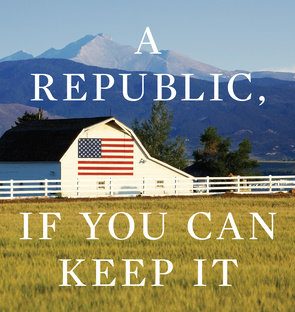Neil Gorsuch’s book misses its own points

Fair use image Crown Forum Publishing/Penguin Random House
Supreme Court Justice Neil Gorsuch released his book on Sept. 10 entitled ‘A Republic, If You Can Keep It.’
October 21, 2019
When asked in 1787, while leaving the Constitutional Convention, Benjamin Franklin was asked by a bystander what type of government the founders created. Franklin replied, “a republic, if you can keep it.”
Two hundred and thirty two years later, Supreme Court Justice Neil Gorsuch believes that originalism is the best way to keep Franklin’s republic. Gorsuch describes originalism as “simply the idea that when interpreting the Constitution, we should look to text and history and how the document was understood at the time of its ratification.”
Gorsuch released a new book on Sept. 10 entitled, after Franklin’s quote, “A Republic, If You Can Keep It.” Gorsuch is a self-described originalist when it comes to the Constitution. After reading the book, it is apparent that Gorsuch believes the only right way to interpret the Constitution is in an originalist fashion. Gorsuch and others believe this because the founders thought through every possible scenario, and their rulings should not deviate from the Constitution.
Originalism and the Constitution
When it comes to Constitution, originalism is something that almost seems logical. Laws “should mean the same today as they did then and they should never be diminished by courts or judges.”
The fact of the matter is, originalism means the Constitution should not be changed, even though Article V of the Constitution says there are processes for amending the Constitution.
Conservative, by definition, means being cautious or even unwilling to change. Senior Sidney Foreman says that although following the law as written should mostly be the book judges rule by, originalism means “we can’t interpret things, we can’t change with the modernization of society.”
This has real effects because today is different than when the Founders wrote the document. If the Constitution were to not be amended, African Americans still would not be protected under the Fourteenth Amendment and women still would not have the guaranteed right to vote under the Nineteenth Amendment.
Most people however, still agree there are certain rights that can be interpreted differently, but still in line with the natural rights given by the Constitution.
“I think that [the right to bear arms] is a fundamental right,” history teacher Matt Kiedrowski said. “However, the need to bear arms back then is much different than the need to bear arms today.”
That is exactly what the debate over originalism boils down to, the difference between today and the 1700’s. Originalists say that the only thing that it comes down to is a strict reading to apply fairness to all around them. But the founders did not intend for it to be completely equal in their kept republic.
Gorsuch and the Constitution
Throughout the book, Gorsuch tries to maintain an apolitical message, but originalism is typically a conservative ideal. Antonin Scalia was an originalist and a notorious conservative whose seat Gorsuch succeeded.
“I think he’s going to be much more conservative, much more traditional,” Kiedrowski said.
The veil that Gorsuch tries to hide under, the impartiality he wants to maintain, has disappeared. His beliefs are conservative hiding in plain sight.
Senior Nicole Lamers agrees that while Gorsuch is conservative and has a typical conservative reading of the Constitution, “if you’re going to be a judge, you can have absolutely no bias.”
One of the point Gorsuch brings up in his book is judges are to remain impartial, no matter the circumstance. The only problem with that, however, is many Americans consider Gorsuch to be conservative leaning and that he will rule with a conservative bias rather than a liberal, or even independent approach.
The last goal Gorsuch set out to achieve in the book is informing the public, quoting “half of Americans don’t know that freedom is protected by the First Amendment” and “10 percent [of Americans] believe that [Judge Judy] serves on the Supreme Court.”
Gorsuch wanted to show that the political system is not one that is divided and one in which Supreme Court nominations are not divisive, in an attempt to heal the divide between conservatives and liberals.
The only problem is some of these parts of a democracy are meant to be divisive. “Most of the time they’re divisive. I don’t think that these [divisive nominations] are unique. It’s actually rare when they’re not hyper divisive,” Kiedrowski said.
Throughout the novel, Gorsuch tries to play an apolitical figure. In reality, he is simply writing a book about the persuasion of his views, under the veil of educating an uneducated and misinformed public.











Kathleen Pothen • Nov 3, 2019 at 6:18 pm
I really like your lead with the quote from Ben Franklin that explains the meaning behind the title of the novel. I like how you critically analyzed Gorsuch’s points and explained why you don´t agree with them. I like how you tied in current controversial issues such as interpretations of the 2nd Amendment. I agree with the point you made that all though political figures like Gorsuch attempt to be unbiased we should always be critical of their persuasions because effective democracies always have multiple point of views.